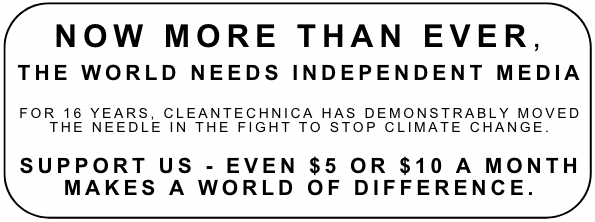
Sign up for daily news updates from CleanTechnica on email. Or follow us on Google News!
No, it’s not April 1. To close out 2024, the Environmental Protection Agency (EPA) gave a company in Florida approval to use radioactive materials in road construction. “Florida man” stories are going to get a lot more interesting. …
Joking aside, this is a real story and the company, Mosaic Fertilizer, is going to initially build a practice road on its own private property using the radioactive material, phosphogypsum. The company is based in the Tampa area, and it seems the test will be done on New Wales Rd near Bradley Junction and Mulberry. It’s just about an hour away from me!
“In the past, the agency has raised concerns about the use of this material in road building. It said in 1992 that use of phosphogypsum in road construction created risks for both construction workers and also anyone who later builds a home where the phosphogypsum road had once been,” The Hill writes. So, what has changed? Have they determined there is no risk after all? Not really. They’ve just concluded that members of the public aren’t expected to come in contact with the private road. Er … really?
“However, Mosaic, which will build the road, has described the effort as part of a pilot project that will ‘demonstrate the range of … road construction designs.’ It’s not clear if additional road construction will follow — though doing so would likely require further approvals,” The Hill adds. This is not filling me with confidence, especially with Trump entering the White House soon again. In fact, even this latest development stems from the first Trump administration.
“Using the slightly radioactive substance in road building has been a hot topic for decades. Congress actually amended the Clean Air Act in 1992 to expressly forbid the use of phosphogypsum in road construction, though it remained eligible for use in other projects on a case-by-case basis. The Trump Administration approved phosphogypsum use in road construction in 2020, but the incoming Biden administration put a halt to that approval, calling the new rules for use of the radioactive substance too broad reaching. Florida also passed legislation in 2023 to allow the company to build the road, but it all hinged on EPA clearance first,” Jalopnik writes.
As one may have assumed from seeing the company’s name, phosphogypsum is a material created from the production of fertilizer. “When processing phosphate rock to make fertilizer, the phosphorous is removed by dissolving the rock in an acidic solution,” the EPA informs us. This creates phosphogypsum. This side product “contains radium, which then off-gases radon (you know, the stuff we were terrified of in the late ’80s/early ’90s.),” Jalopnik notes.
Here’s more from the EPA on this potential new road-building material that would surely help Mosaic Fertilizer’s bottom line:
“Phosphogypsum is a solid waste byproduct from processing phosphate ore to make phosphoric acid that is later used in fertilizer. The phosphate ore and the resulting phosphogypsum contain radium, which decays to form radon gas. Both radium and radon are radioactive and can cause cancer.”
This is fine. What could go wrong?

Chip in a few dollars a month to help support independent cleantech coverage that helps to accelerate the cleantech revolution!
Have a tip for CleanTechnica? Want to advertise? Want to suggest a guest for our CleanTech Talk podcast? Contact us here.
Sign up for our daily newsletter for 15 new cleantech stories a day. Or sign up for our weekly one if daily is too frequent.
CleanTechnica uses affiliate links. See our policy here.
CleanTechnica’s Comment Policy




